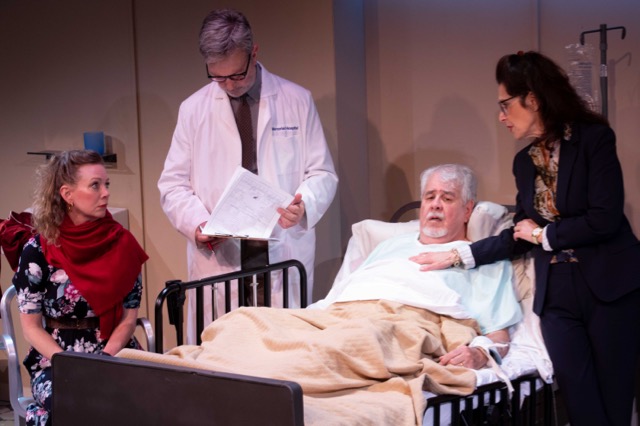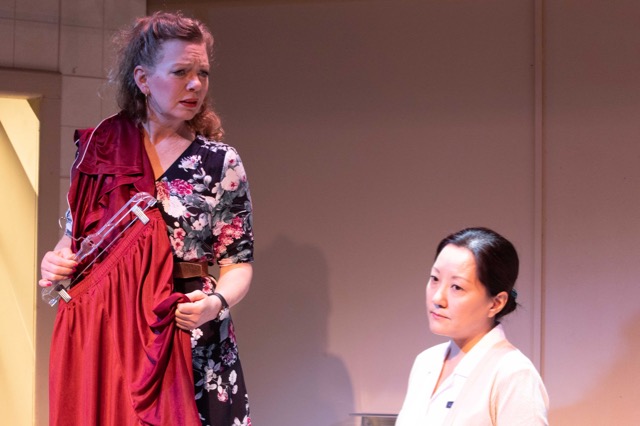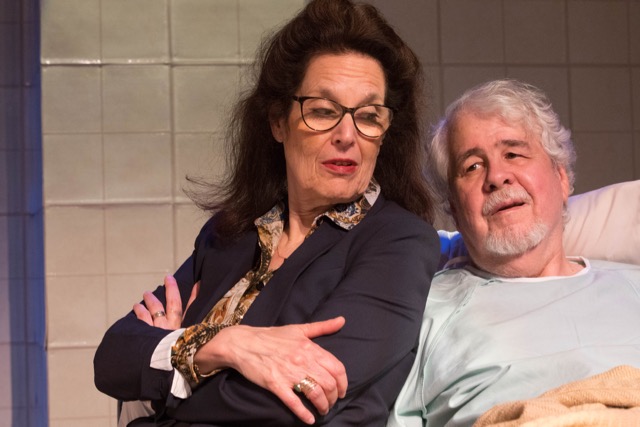A lifetime of family memories and five years of rewrites has garnered Leslie Ayvazian’s “100 Aprils” a spot in Rogue Machine’s 2018 season. The run has been extended twice and the schedule encourages audiences to stay after matinee performances on Sundays, for talkbacks with special guests.
The play packs a sobering punch while shedding light on a subject that has been swept under the carpet for over a century, the Armenian genocide. Strong writing and heartfelt performances make this a production worth seeing.
Described as a darkly comic look at the generational consequences, when history is denied, it travels a fine line between reality and hallucination. John Saypian is somewhat of a modern-day Don Quixote. He and his wife are second generation Armenians whose parents escaped the genocide. John believes that a tormentor is pursuing him, and as his health begins to fail him so does his mind. But, not his memories of the atrocities that he witnessed as a child, along with his family.

To better understand where the subtleties and depth of writing like this is conceived, we asked playwright Leslie Ayvazian to talk about the journey of creating it.
HR: When did you begin, and what inspired you, to write 100 Aprils?
Leslie: I began the project about five years ago. Initially, I wanted to write a play to honor, and to coincide with, the 100-year commemoration of the Armenian genocide. Some excerpts of my play were included by CTG for their event “Staging the Unstageable” at the Kirk Douglas Theatre in 2015 but this is the true world premiere of the full piece at Rogue Machine.
Growing up in an Armenian family gave me endless resources for writing about this subject. I write what I know. My father was born in Turkey and escaped to NYC. Much of what I know of the genocide is what I’ve learned from my grandmother and my father’s stories, and even from his silences. Some things were too horrific to fully articulate.

I’m inspired to write about what I am pursuing, and I write what I want to know. For me I want to know why the world has not accepted the history of the Armenians when there is so much proof and so much evidence and yet there is this persistent denial.
HR: Is that what you hope audiences will become more aware of when they see the play?
Leslie: I just hope that audiences will find a reason that it’s relative, and that they are glad that they had the experience of seeing it. I don’t write plays to teach people anything. I write things that are true for me and I hope they’re true for others. I was looking forward to having the play open at Rogue Machine in Los Angeles because it’s a great company, and there is a large community of Armenians in the city. This community was profoundly supportive of my play, Nine Armenians, when Gordon Davidson directed it at the Mark Taper Forum years ago. Gordon believed this story must be told. And it doesn’t matter if it’s been 100 years or 1000 years, people must know the truth. They need to know how the genocide influences our lives, and generations to come. We will keep telling the story so it’s not forgotten, 1.5 million people cannot be brutally slaughtered and it still doesn’t show up in any history books, and certainly not in America.
It’s just a matter of trying to set the world right in truth.

HR: How did you decide on the style of the play? You have described it as absurdist, correct?
Leslie: It comes from an absurdist world, with a sense of humor about the ways that we cope and learn to survive. Any history of family members is a surreal world. Although this piece lives partially in hallucination and partially in dreams that cannot be silenced, the characters are always reaching for what is real.
This style emerged from the experience of denial, and how it affects people who live in a world that has little connection to the truth of history. I remember how my grandmother would talk, and sometimes she would just drift off looking out the window with the pain of those memories. As a physician, my father carried this sorrow throughout his life. Most people from Armenian families have a version of this story. I’m not a person who paints pictures that are set in elaborately designed living rooms. I don’t write plays like that.
100 Aprils has extended twice to run Saturdays and Mondays at 8:30pm, Sundays at 3:00pm through July 23, 2018. Rogue Machine is located in The Met, 1089 N Oxford Ave, Los Angeles, CA 90029. Tickets are $40. Reservations: 855-585-5185 or at www.roguemachinetheatre.com




